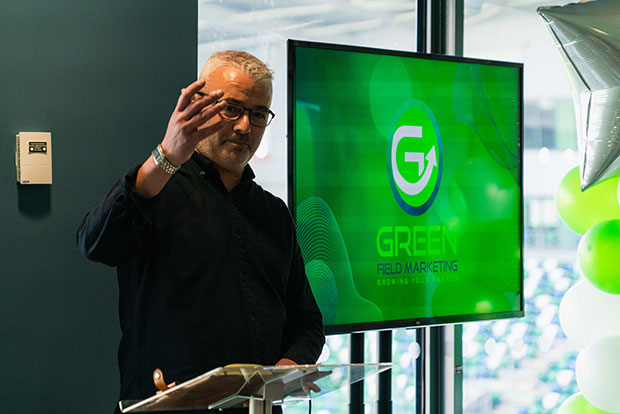The convenience retail landscape has changed a lot in recent years, particularly with the cost-of-living crisis hitting both retailers and consumers hard, meaning retailers need to be more considered than ever before when deciding which brands and products to stock and promote to ensure they’re keeping up with consumer demand.
 Going into 2024, retailers need to be asking more of their brands. Do they talk about the entire category first? How can they support from a data sharing perspective? What POS do they have available? What sales uplift should they expect when these are implemented? What are the key benefits and target market for this NPD? The modern-day retailer needs more than a rushed presentation on a tablet, and there’s a lot more direct value they can get from a visit than free stock, writes Green Field Marketing’s Managing Director, Russell Johnston.
Going into 2024, retailers need to be asking more of their brands. Do they talk about the entire category first? How can they support from a data sharing perspective? What POS do they have available? What sales uplift should they expect when these are implemented? What are the key benefits and target market for this NPD? The modern-day retailer needs more than a rushed presentation on a tablet, and there’s a lot more direct value they can get from a visit than free stock, writes Green Field Marketing’s Managing Director, Russell Johnston.
Field Marketing is the key for brands to get their products in front of prospective stockists, and Field Development Representatives (FDRs) are the face of those brands for retailers when they’re pitching products. It cannot be understated just how important the relationship is between FDRs and their clients. From small talk before getting into the business chat, to the transparency and attention to detail in relaying key objectives and unique challenges for your business, when there is good rapport between FDR and client it opens the possibility for better deals and allows the FDR to offer more tailored solutions and insights.
Retailers should see meetings with FDRs as invaluable opportunities to gain insight and advice on improving their effectiveness, and therefore communicate with them regularly and ensure they’re getting as much value as possible. FDRs should be pushed for category and marketing insights along with sales data to help retailers make informed decisions, and adjusting inventory should always be considered to reflect consumer trends. Brands will have data on industry trends so retailers should make sure they’re receiving this information and feel informed on what’s going on in the convenience retail sector.
FDRs jobs go beyond just recommending products and sharing data insights – they should be maximised as an asset by enquiring about advice on promotion and merchandising within specific outlets and asked about any training opportunities. Often brands can provide POS and tips on creating effective in-store displays that will ultimately sell more product. Training will also improve retail staff’s product knowledge and help them to discuss and sell to customers more confidently.
There are also often opportunities for retailers to collaborate with brands on joint marketing campaigns, particularly around key calendar moments like major sporting competitions and business holidays. Retailers should ask their reps about any such opportunities in the pipeline, as by leveraging these they can expect an increase in footfall and sales.
To ensure the relationship between brand and retailers is working to its best possibility, it’s key to ensure the performance of products is meticulously monitored and an open and honest communication is maintained so that sales reps can provide feedback and suggestions to combat any problems. Working together to adjust inventory accordingly and run bespoke promotions will ensure retailers are maximising on sales opportunities.
This then ties into the longer-term importance of evaluating ROI and measuring success. When taking on new brands and products retailers should establish key performance indicators (KPIs) with their FDRs that measure success against an outlet’s key objectives. These can then be continually analysed for return on investment on various brand partnerships and ensure the focus is being put on the brands that bring the most value.
At Green Field Marketing we strongly believe that, particularly in the Convenience and Impulse channel, FDRs should be Data-Fed rather than Data-Led. Our FDRs are trained in the use of the data we provide them with and rather than telling them what specifically to do in each channel, we empower them to make the right decisions for each individual retailer. This approach from our FDRs is the most effective approach for not only allowing them to do the best job for our brands, but also to allow them to make more informed, adaptable, and customer-centric decisions. This means that they are making the right choices for each individual customer rather than a blanket approach to the marketplace which may not be the right fit for all customers.
We break this approach down into 7 key factors that showcase its effectiveness in supporting retailers:
1. Contextual Decision-Making: FDRs can consider data alongside other factors for more contextually relevant decisions.
2. Adaptability: Allows for flexibility in response to real-time market changes and customer preferences.
3. Customer-Centric: Prioritises customer insights and feedback over rigid data-driven rules.
4. Competitive Advantage: Enables retailers to respond to unique local market dynamics and trends.
5. Innovation: Encourages reps to experiment with new strategies and product offerings.
6. Long-Term Planning: Supports strategic thinking and the development of a forward-looking sales approach.
7. Customisation: Allows for tailored approaches to different store locations or customer segments.
We would urge Retailers to get full value out of the relationship with Brands’ Field Development Representatives for their specific needs, by engaging with them and building a working partnership specific to their store, their needs and ultimately their profitability.





Comments are closed.